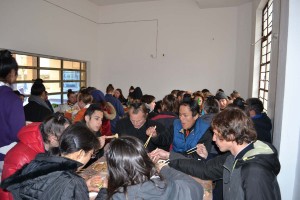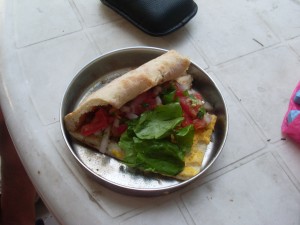Cultural Blind Spots
 I had a conversation with some of my classmates the other day about eating meals with our Chinese companions. The fact is, noisy eating doesn’t carry the taboo of bad manners here the way it does back home. Notice your own reaction as I describe this– lip smacking, loud slurping, and that “chuk chuk” sound you get when someone chews with their mouth open. How did you react? Did you crinkle your nose, or have a little involuntary shudder? It’s pretty ingrained in me to have a fairly strong reaction to these behaviors, and I gather that most other westerners feel the same way.
I had a conversation with some of my classmates the other day about eating meals with our Chinese companions. The fact is, noisy eating doesn’t carry the taboo of bad manners here the way it does back home. Notice your own reaction as I describe this– lip smacking, loud slurping, and that “chuk chuk” sound you get when someone chews with their mouth open. How did you react? Did you crinkle your nose, or have a little involuntary shudder? It’s pretty ingrained in me to have a fairly strong reaction to these behaviors, and I gather that most other westerners feel the same way.
Change gears for a second. I once watched an lecture on TV about wine tasting. The instructor talked about essentially slurping the wine. Our sense of smell is such a large part of our sense of taste, so getting air into the wine and the bouquet into your nose lets you taste the wine more completely.
So what if our Chinese companions are experiencing their food more completely than we are thanks to eating habits that we won’t even consider because we have been taught to find them gross? Please don’t misunderstand, I am not arguing for slurping and open mouth chewing. But I think this example illustrates pretty clearly the idea of a cultural blind spot: an idea and experience that people of a given culture can’t even perceive because a cultural inhibition stops them from even looking in that direction. And I think this example also makes clear how subtle these inhibitions are. Coming to another country, living here, and being forced to deal with this culture as a daily reality instead of a holiday novelty has made me question many such customs that I had taken for granted before. I have been forced to reconsider the difference between being of a specific culture and being human.
Tacos in Wudang

As I am settling back into the rhythm of life in Wudangshan, I thought I would write down one of my biggest impressions from my winter at home.
There’s truly no place like home. As much fun and excitement as maneuvering intercultural waters can be, the smallest tasks become significant undertakings. Example: yesterday I made tacos for my brother, Gao, who likes my cooking and missed it while I was gone. At home, I could complete a taco dinner, from conceiving the idea to plates hitting the table, in a few hours. There are grocery stores, organized in a way I understand. Ingredients are fairly consistently available, and I can ask questions comfortably and trust that the context in which I mean them will be understood.The conveniences of modern kitchens are not to be underrated.
Here, I shop at an outdoor market 20 minutes walk from our school. Crowded stalls separate my shopping into dry goods, fresh vegetables, and meat, tripling the amount of haggling to be done while I dodge the piles of rotting refuse that the shopkeepers throw into the center aisle. Yesterday, I had to search high and low at three different markets to find cilantro, which normally would be easily available at any of the shops (I eventually found a rather wilted handful that worked well enough, though I think it was the last cilantro in all of Wudang). The meat is sold hanging on a hook in an outdoor stall. Logically, the seller does not take it out in the heat of the day, so if I want to buy meat I have to schedule my shopping for early morning or late afternoon. When I went to buy the bread I use to substitute for a tortilla, the vendor tried to tell me I couldn’t have the ones I wanted. I started to walk away, and his wife grabbed me and tried to direct my attention to some other, very nice, un-tortilla like bread. I said no thank you, and started to walk away again, and they thrust the tortilla bread at me, at which point I realized the price had gone up while I was away by 50%. Then I got home and realized why they had not wanted to sell it to me in the first place — stale, very stale. Then I had to use the kitchen. I tried to use one wok, and realized the wood fire beneath it from earlier had already died. I then switched to a coal brick burner, which cooked the food very nicely although I was choking on the coal fumes the whole while. Not bad tacos though, if I do say 🙂
I suspect that a Chinese person would feel as perplexed trying to prepare familiar foods in my local supermarket as I feel trying to cook here in China. It reminds me that no matter how widely I travel, no place will ever put me so at ease as the good old U.S.A.
Food and drink is SELF DEFENSE
What did you eat today? Did the hot weather encourage you to drink the promoted drinks or to go back to the basics of water? Did you see the latest report from the American Academy of Pediatrics about energy drinks, including drinks like Gatorade for our children. As a teacher I must not only set the example, but I must help our students take a deep look at what and how they eat. Even those of us who “eat good”, is what we are eating really good or just better than what others are doing? This is not a matter of comparisons. It is a matter of doing what is best for us and our children.
As a family, as a school, as a community, can we be on a mission to change – make a difference in our community? Starting with our own diet, we can all be resolved to learn about our food and our health. No excuses, we will be the teachers and parents that our children deserve.
